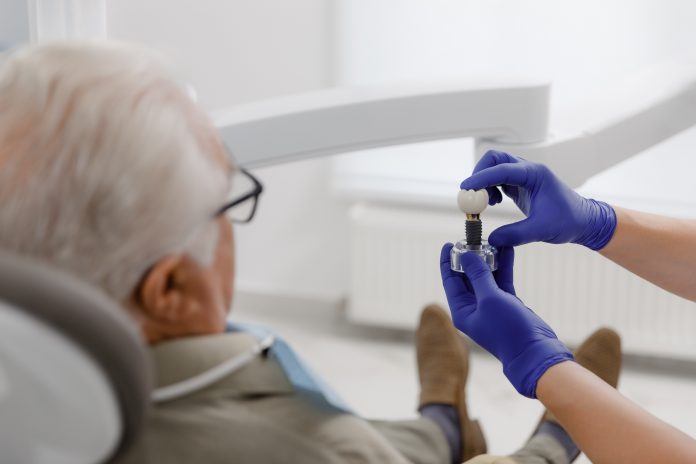Tooth loss is a common experience as people age. While dentures and bridges have traditionally been used to replace missing teeth, dental implants have emerged as a superior and long-lasting solution.
For many seniors, concerns may linger about whether implants suit their age group. However, this article aims to dispel those myths and demonstrate how dental implants can significantly improve their quality of life.
Unlock the transformative potential of dental implants in enhancing oral health and overall quality of life for seniors. Continue reading to unveil these life-changing benefits.
What Are Dental Implants?
A dental implant acts as a biocompatible anchor, a screw-like post made of titanium that replaces a missing tooth root and supports a natural-looking crown. Once the implant fuses with the jawbone through osseointegration, it becomes a strong and sturdy foundation.
A custom-made artificial tooth (crown) is then attached to the implant, providing a replacement tooth that looks and functions like a natural tooth. Unlike fixed bridges, dental implants don’t rely on neighboring teeth for support, making them a stand-alone, durable anchor solution for missing teeth.
Many seniors think dental implants are unsuitable for them, but this is a misconception. There is no age limit for implants, but factors like jawbone density and medical history need consideration. Seniors should discuss their specific concerns with an experienced implant dentist, who can thoroughly evaluate if they’re suitable candidate for dental implants.
Benefits of Dental Implants for Seniors
Here are the worthwhile benefits of having dental implants in your golden years.
-
Improved Chewing Ability
Tooth loss significantly impacts chewing ability, leading to dietary limitations. Dental implants rejuvenate the ability to chew easily, enabling older adults to enjoy nutrient-rich foods that were once challenging to consume. This promotes better overall nutrition and gut health.
-
Enhanced Confidence and Speech
Missing or losing teeth can negatively impact a person’s self-esteem and confidence when speaking or smiling. Implants provide a secure and natural-looking solution, allowing seniors to smile confidently and speak clearly without worrying about dentures slipping or clicking.
-
Preserves Jawbone Health
When teeth are missing for a long time, the jawbone gradually deteriorates due to a lack of stimulation. Dental implants aren’t only for aesthetic purposes; their placement stimulates the jawbone to prevent bone loss. This preserves facial structure and prevents sunken appearance that can sometimes accompany tooth loss.
-
Improved Oral Health
Traditional dentures can sometimes make maintaining proper oral hygiene challenging. Food particles can get trapped under dentures, increasing the risk of gum disease and infections. Implants mimic natural teeth, allowing for easier and more effective brushing and flossing, ultimately leading to better oral health.
-
Durability and Longevity
Dental implants can be considered as a permanent solution for dental issues for seniors that stand the test of time. With diligent maintenance, these resilient replacements can endure for a lifetime, sparing seniors the recurring expense and inconvenience of denture replacements. This durability translates into substantial long-term cost savings, providing a wise investment for those in their golden years.
-
Improved Quality of Life
The advantages of dental implants extend far beyond aesthetics and chewing. They can significantly improve a senior’s overall quality of life. Greater confidence in social interactions, a wider range of dietary options, and improved oral health all contribute to a more fulfilling and enjoyable life.
Addressing Concerns About Age and Implants
While age itself is not a barrier to dental implants, there are some common concerns that deserve attention before proceeding. Understanding these concerns beforehand is a crucial part of preparing for dental implant surgery:
- Healing Time: The implant placement process typically involves a healing period of several months. However, advancements in dental techniques have improved healing times, making implants a viable option for many seniors.
- Bone Density: Having adequate bone density in the jaw is crucial for successful implant placement and osseointegration. While some seniors might have lower bone density, bone grafting procedures can often be performed to create a suitable foundation for implants.
- Existing Health Conditions: Certain medical conditions, such as uncontrolled diabetes, osteoporosis, or immune system disorders, may concern seniors about their eligibility. While these conditions must be carefully evaluated, they don’t automatically exclude someone from getting implants.
- Cost Considerations: The initial cost of dental implants is way more costly than other tooth replacement options like dentures or bridges. However, their long-term durability, minimal maintenance requirements, and significant health benefits can make them a cost-effective solution in the long run.
To Sum It All Up
Dental implants offer a viable, age-defying solution for seniors with missing teeth. Misconceptions about age limitations should be disregarded, as implants can provide lifelong benefits with proper overall health and jawbone density.
Improved nutrition, confidence, bone preservation, oral hygiene, and durability make implants worthwhile despite their higher initial costs compared to dentures. Any concerns about medical conditions or other factors can be addressed through consultation with an experienced implant dentist.
























